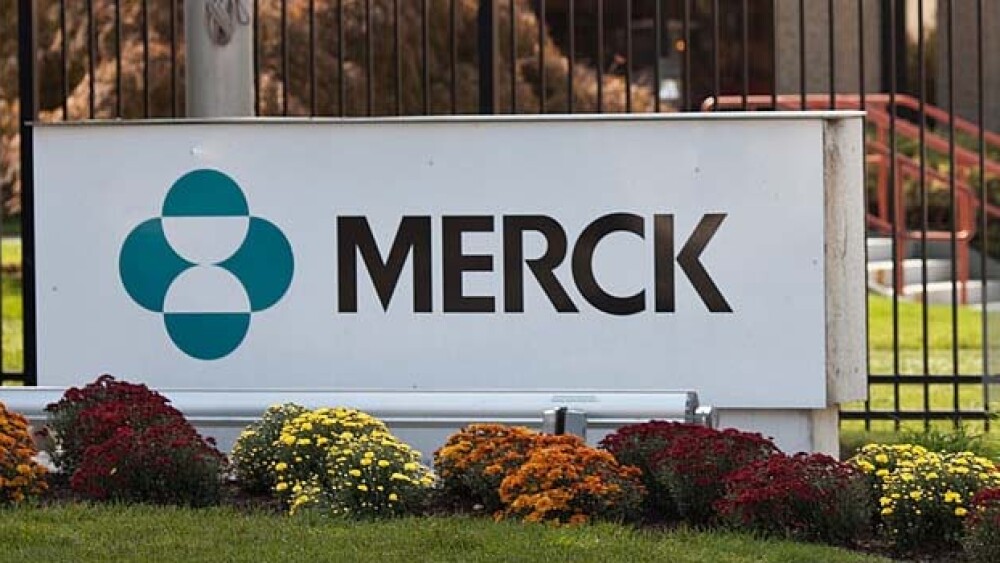Nearly two months ahead of the planned PDUFA date, the U.S. Food and Drug Administration approved two new HIV-1 treatments developed by Merck. The FDA gave the go ahead for Delstrigo, a once-per day triple combination treatment and Pifeltro, a new non-nucleoside reverse transcriptase inhibitor.
Nearly two months ahead of the planned PDUFA date, the U.S. Food and Drug Administration (FDA) approved two new HIV-1 treatments developed by Merck. The FDA gave the go-ahead for Delstrigo, a once-per-day triple combination treatment, and Pifeltro, a new non-nucleoside reverse transcriptase inhibitor.
The FDA had scheduled a PDUFA date of Oct. 23 for the drugs. Both Delstrigo and Pifeltro are indicated for the treatment of HIV-1 in adults with no prior antiretroviral treatment experience. Pifeltro was approved as a treatment to be administered in combination with other antiretroviral medications, Merck said. Delstrigo, which is a combination of doravirine, lamivudine and tenofovir disoproxil fumarate, contains a boxed warning regarding post-treatment acute exacerbation of hepatitis B (HBV) infection.
Nick Kartsonis, senior vice president of clinical research for infectious disease and vaccines at Merck, told BioSpace in an exclusive interview that the company was pleased with the early approval. Although Merck did not file for approval under a priority review, Kartsonis quipped that the green light two months ahead of the PDUFA date gave the treatments a sense of being under that kind of review.
Kartsonis said these two new HIV treatments are additional tools that physicians have to treat their patients.
“It’s [HIV] a lifelong disease and it’s important for clinicians to have these tools available for their patients,” Kartsonis said.
That was echoed in a statement released earlier by George Hanna, Merck’s therapeutic head of infectious diseases, who said the approval of Delstrigo and Pifeltro offer a “compelling clinical profile for clinicians and people living with HIV.”
Merck anticipates both drugs being available to wholesalers within a month. The company noted that it is working to obtain access for patients in government-sponsored programs, including Medicare Part D, Medicaid and AIDS Drug Assistance Programs. Kartsonis said the Merck worked diligently to be ready for the potential approval of the treatments.
The two Merck drugs were approved based on data from Phase III trial results that showed the efficacy and safety of both drugs. In the DRIVE AHEAD clinical trial evaluating Delstrigo, the triple-combination treatment demonstrated sustained viral suppression through 48 weeks. Data showed that 84 percent of the patients on Delstrigo achieved viral suppression. The efficacy of Pifeltro was evaluated in the Phase III DRIVE-FORWARD trial. The drug demonstrated sustained viral suppression through 48 weeks. Data shows that 84 percent of the patients taking Pifeltro achieved viral suppression of HIV-1 RNA.
In clinical trials, Merck noticed Delstrigo and Pifeltro provided an added benefit for patients. The medications helped lower cholesterol levels in patients. Kartsonis said the drugs are not labeled for that indication, but he called it an “added benefit that is unique to the two drugs.”
Kartsonis said that the benefit is something that the company believes prescribing physicians will take note of when treating patients. He said HIV patients tend to be more susceptible for cardiovascular issues and “having a medication that doesn’t further underlie the risk is a fascinating accomplishment.” The cholesterol-lowering effects of the medication could benefit those HIV patients who may have to take medication for their cholesterol levels.
Kartsonis said Merck isn’t resting in developing treatments for HIV. In its pipeline is another treatment, MK-8591 has a “completely new mechanism of action” and has the potential to be administered less than once per day.
Merck’s two new HIV drugs are the latest this year the FDA has approved for the treatment of AIDS. Now the question is how will Merck’s drugs stack up against treatments from Gilead Sciences and GlaxoSmithKline that dominate the market?
Data from CDC shows there were an estimated 37,600 new HIV infections in the United States in 2014, the most recent year for which the agency provides data. In February the FDA gave its approval to Gilead Sciences Biktarvy, a triple combination treatment of bictegravir and emtricitabine/tenofovir alafenamide for the treatment of HIV-1 in adults who haven’t been treated with antiretrovirals. In March the FDA approved Trogarzo (ibalizumab), the first HIV-1 inhibitor for patients with multi-drug resistant HIV-1. Mylan also snagged approval for its HIV treatment Symfi in March. Mylan’s Symfi (efavirnenz, lamivudine and tenofovir disoproxil fumarate) was approved for adult and pediatric HIV-1 patients who weigh at least 40 kilograms.
Last year the FDA approved Juluca, the combination treatment developed by GlaxoSmithKline’s subsidiary ViiV Healthcare and Janssen Pharmaceutical. Juluca combines ViiV’s dolutegravir, an integrase strand transfer inhibitor and Janssen’s rilpivirine, a non-nucleoside reverse transcriptase inhibitor.





